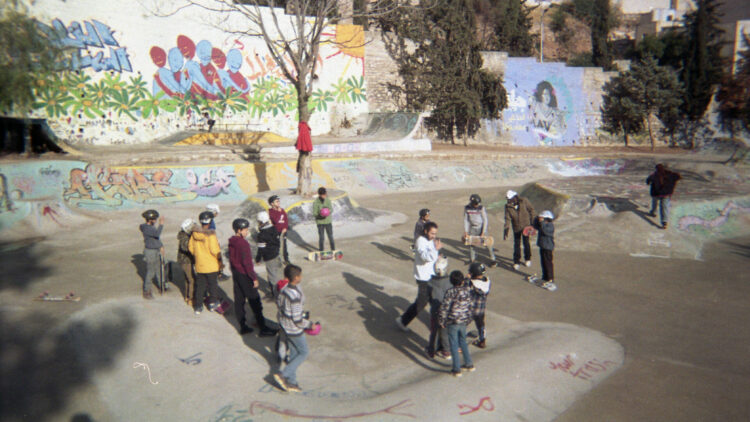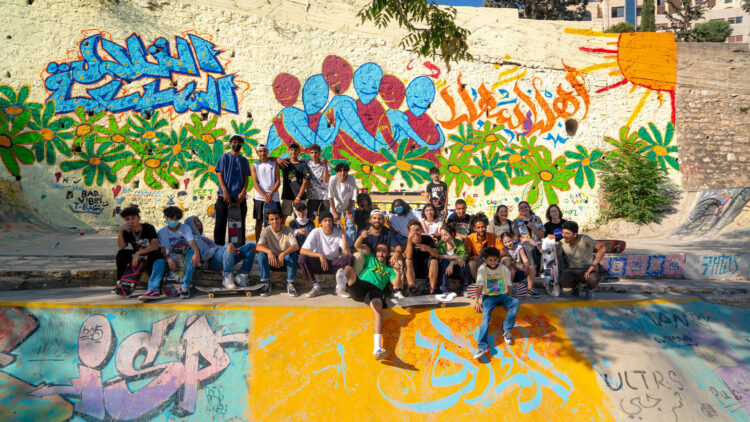Overwhelmed by undulating hills, Jordan’s capital is twice the size of Cairo with less than a quarter of its population. It is a city of East and West. Where the former neighborhoods were grown out of refugee camps and squats, the latter are reserved for the rich – a well-served homestead of Amman’s more fortunate inhabitants. But amid all its community conflicts and gaps in public services for the majority, there exist grassroots organizations stepping up to build bridges between cultures, to empower and unite the next generation.
7Hills is one such organization; one which THE SKATEROOM is making a commitment to fund in 2022, thanks to our upcoming Mark GONZALES launch with HVW8 LA. So consider this a little introduction to 7Hills, for all of you supporters of social change through skateboarding.

Shot by the kids of Amman
Zakaria, you were born and raised in Amman, and it was really your work which planted the seed for 7Hills to grow over the past decade. Can you tell us a little bit about that journey?
Z: Sure. The skate scene in Amman started in about 2003. There was a very small community, and we got together on the internet. The main plaza in the city became the meet-up spot, it wasn’t a very welcoming place for us but we just kept going back. There wasn’t any other place we could meet. We thought, you know, if we could have a skatepark somewhere, nobody would kick us out.
What, and you just went and built one?
Z: Well, in 2009 I started my own skateboard company: Philadelphia Skateboards. It picked up, and nearly five years later – in 2014 – I got contacted by MakeLifeSkateLife who had a plan to build a skatepark here in Amman. So we started a collaboration between our organizations.
"We thought, you know, if we could have a skatepark somewhere, nobody would kick us out."
Together we approached the city and tried to secure a public space to build the park. We were going to be raising the funds from elsewhere and then would donate it back to the city, so of course they were excited about it, and so we began our crowdfunding campaign.

Shot by Mural Eassa
How much did you need?
Z: Initially, we were asking for 15,000 dollars, but we were able to raise 22,000. That was mind-blowing to me. I was doubting the campaign from the beginning, but it was the embodiment of the skateboarding community that really proved me wrong. I couldn’t understand back then why people in Europe would donate money to build a skatepark in Jordan.
So you’ve got the cash, you’ve got a space – what’s next?
Z: So at the end of 2014, the volunteers came to Amman to build the park. We started digging and the local community got involved. People from the neighborhood came by, they asked us questions about it, and we explained that a skatepark was coming. Of course, the next question was: “How much is the entry?” When they heard it was free, they got really excited. People from the mosque started to come by to hang out, parents sent us food packages – we had a lot of support. Locals would help with shoveling, locals gave their expertise. By the end of the year, we finished the park and started giving out some skateboards to the kids. A couple years later, Kas turned up for his studies.
Kas, you were from a very different world. How did you come to Jordan?
K: I was studying in Belgium for my Masters, and I was trying to connect my studies to skateboarding and youth work. I had reached out to organizations like Skateistan, SkateAid, SkatePal and MakeLifeSkateLife – these were the ones that were around back then. Finally, I managed to develop an internship with MLSL in Jordan, reactivating the park they had built with a skateboarding program for the kids.

Shot by Mohammed Zakaria
So the skatepark is up and running, but it needed some structure?
K: I flew to Jordan and met Zakaria, and together we developed a weekly program which would make skateboarding more accessible to the youth. It grew beyond the kids in the local neighborhoods, working with organizations to bus kids in from the outer communities or Amman. The Sudanese community, for example, is super underserved in Jordan. They aren’t granted refugee status, the kids are bullied, and their parents don’t leave their homes very often. We wanted to ensure that they could all gather and take part in our sessions.
"The kids are bullied, and their parents don’t leave their homes very often. We wanted to ensure that they could all gather and take part in our sessions. "
Z: People in Amman are racist towards the Sudanese community, and we noticed that the scarcity of resources was actually helping us fight that. We told the kids who didn’t want to skate with Sudanese kids that they weren’t going to be able to come here if they were prejudiced towards them. So many of them dropped those behaviors. And then their families would come, and it became an important place for these communities to form relationships while their kids are skating.

Shot by Chris Mann
K: All the different communities were skating together. And we started our Girls Only and Youth Leadership programs. We coached local kids to become skateboard teachers, and the more they took part, the more credits they could earn. With these credits, they could get skateboards and skate clothing from us. It encourages them to take responsibility, and do something for something in return.
How did you see this impact the role of women in the skate community?
Z: It’s a beautiful development. We can really see the change. The boys used to throw rocks at us when we were building the park. We tried to include them, and before long they were part of the skatepark. Similarly, girls were nervous and would just stand around watching. But before long, the kids who had once been throwing rocks, became youth leaders and were inviting the girls in to skate. My favourite example of this is from when we built the basketball court. The boys weren’t letting the girls play, so the girls came to me to ask if I could help them. But before I even got to the court, the girls had rushed ahead to sit in the middle of the court, blocking the boys’ game. They were like: “If we can’t play, nobody can play.” Like, civil disobedience. And so the boys invited them in to take their space. You know, there's segregation between boys and girls in Jordan, in the schools, on the streets. It’s often the case that they don't know how to behave around each other. But having this space where they can mix and interact, it nurtures equality and understanding. And now we have these super cool Yemeni and Somali girl crews popping up. They’re so fucking cool.

Shot: Thomas van Diest
How has the local culture of Amman influenced your “homegrown” culture of skateboarding?
K: The culture of skateboarding at 7Hills isn’t Westernized at all. Kids don’t care about the names of tricks, they just use the skateboard to express themselves. I think we’re quite lucky that we were able to let this local ‘definition’ of skateboarding arise, because it makes it easier to work with the girls. It’s not a ‘male’ sport, so parents let their daughters play.
"I say this all the time, but Amman is becoming the New York of the Middle East."
Z: You know, I was lucky enough to get a skateboard when I was young. I got hooked, and when I was 16 we got the internet, so I started to watch skateboarding videos, learning tricks, and learning those Western influences. But with these kids, it’s undefined. We just threw a toy into the community, and watched what happened. A lot of our volunteers say that they see more girls skateboarding here than they do in Europe, which is fucking cool.
And you’ve developed an art-space over the past year where kids can do workshops adjacent to skateboarding, right?
Z: Yeah, we run jewelry workshops where kids can make stuff from recycled skateboards. We run woodwork classes, photography, screen-printing for T-shirts. We want to teach the youth to think in an entrepreneurial way. You know, if they may not be able to go to university, but they can build skills which will serve them in their lives. We’re becoming more of an institution, and we’re being very careful with how we bridge that gap between the public space and our private tuition. We expanded our vision of the skate program. We got the donation of a basketball court, then a calisthenics area. It all happened from the ground up. We built a space we could share. This wasn’t a top down initiative from an outside organization, it was grassroots.

shot by the kids of Amman
It’s quite a journey you’ve both been on with 7Hills. How would you describe Amman to an outsider today, with that decade of development in mind?
Z: The officials are reactive, rather than proactive to the problems in the city. And this extends to the political side of things. We’re between warzones. There are huge swathes of the population which aren’t served or are still looked upon badly. But the stability and currency of Jordan is attracting people, it’s a beautiful mix of different nationalities. But you didn’t ever see this mix in the city. All these kids are good kids, they have issues we need to be aware of, but by focusing on public spaces where young people can come together, opportunities arise for them to empower and educate themselves. So now we have that mix right before our eyes, and it’s fucking fantastic. I say this all the time, but Amman is becoming the New York of the Middle East. A lot of people are surprised by how hospitable, friendly and safe it is here. And that’s not just because of financial investment, it’s because of time – that’s the most important thing you can put into anything. We’ve worked with this community for over seven years, and we’ll be here another 20 – Inshallah.

Shot by Mural Eassa

Shot by the kids of Amman

Shot by the kids of Amman
 Shot by the kids of Amman
Shot by the kids of Amman Shot by Mural Eassa
Shot by Mural Eassa Shot by Mohammed Zakaria
Shot by Mohammed Zakaria Shot by Chris Mann
Shot by Chris Mann Shot: Thomas van Diest
Shot: Thomas van Diest shot by the kids of Amman
shot by the kids of Amman Shot by Mural Eassa
Shot by Mural Eassa Shot by the kids of Amman
Shot by the kids of Amman Shot by the kids of Amman
Shot by the kids of Amman